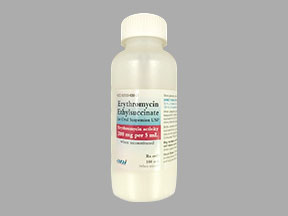
Erythromycin Ethylsuccinate Coupons & Savings Card – Discount Prices from $62.58
Generic for: E.e.s. 400, Eryped 200, Eryped 400
My prescription
Edit
100ML of 200MG/5ML, Erythromycin Ethylsuccinate (1 Bottle)
Select pharmacy

CVS
$62.58
COUPON PRICE
Walgreens
$109.16
COUPON PRICE
Albertsons
$119.08
COUPON PRICE
Walmart
$132.73
COUPON PRICEErythromycin Ethylsuccinate savings card
Show this card to your pharmacist
CVS
$62.58
BIN
ID
PCN
GRP
019876
LH08E717D4
CHIPPO
LHX
Powered by
More prescriptions for urinary tract infection
More prescriptions for urinary tract infection
Price history for Eryped 400 (brand) & Erythromycin Ethylsuccinate (generic)
1 Bottle, 100ML of 200MG/5ML
Average retail price for Eryped 400
Average retail price for Erythromycin Ethylsuccinate
Average SaveHealth price for Erythromycin Ethylsuccinate
Our price history data is based on aggregated prescription data collected from participating pharmacies in America. Our prescription data updates daily to reflect the latest price changes. If you notice a missing data point, it means there wasn't sufficient data available to generate a monetary value for that date.
We analyzed Erythromycin Ethylsuccinate prices for (100ML of 200MG/5ML, 1 Bottle) over the last 12 months. The average retail price was $334.95, while the average price using the SaveHealth discount card was $141.45. That's a savings of approximately 57.77% when using our Erythromycin Ethylsuccinate coupon.
Compared to the generic version, Eryped 400 had an average price of $775.83 over the same time period. With the SaveHealth savings card, Erythromycin Ethylsuccinate is 81.77% cheaper on average than Eryped 400.
*Retail prices are based on pharmacy claims data, and may not be accurate when we don't have enough claims.
Erythromycin Ethylsuccinate dosage forms
Dosage Quantity Price from Per unit 1GM 1 Bottle $1.01 $1.01 1GM 2 Bottles $1.01 $0.51 1GM 3 Bottles $1.01 $0.34 100ML of 200MG/5ML 1 Bottle $62.58 $62.58 100ML of 200MG/5ML 2 Bottles $106.86 $53.43 100ML of 200MG/5ML 3 Bottles $159.14 $53.05 100ML of 400MG/5ML 1 Bottle $79.46 $79.46 100ML of 400MG/5ML 2 Bottles $140.62 $70.31 100ML of 400MG/5ML 3 Bottles $201.78 $67.26
| Dosage | Quantity | Price from | Per unit |
|---|---|---|---|
| 1GM | 1 Bottle | $1.01 | $1.01 |
| 1GM | 2 Bottles | $1.01 | $0.51 |
| 1GM | 3 Bottles | $1.01 | $0.34 |
| 100ML of 200MG/5ML | 1 Bottle | $62.58 | $62.58 |
| 100ML of 200MG/5ML | 2 Bottles | $106.86 | $53.43 |
| 100ML of 200MG/5ML | 3 Bottles | $159.14 | $53.05 |
| 100ML of 400MG/5ML | 1 Bottle | $79.46 | $79.46 |
| 100ML of 400MG/5ML | 2 Bottles | $140.62 | $70.31 |
| 100ML of 400MG/5ML | 3 Bottles | $201.78 | $67.26 |
